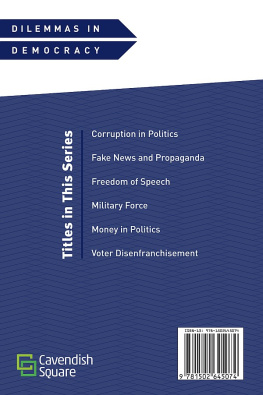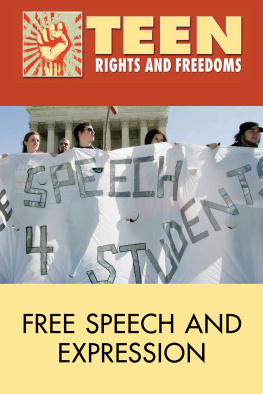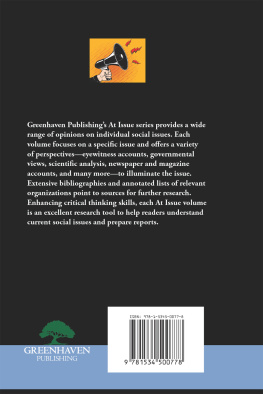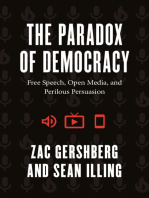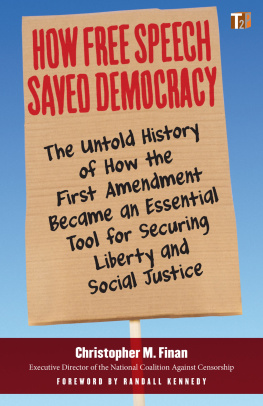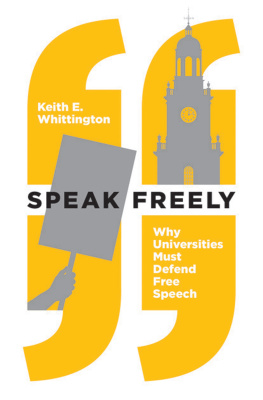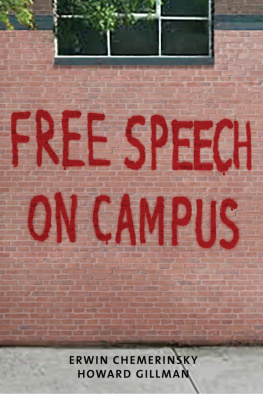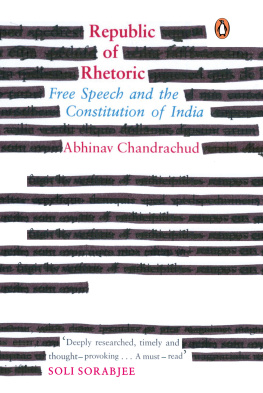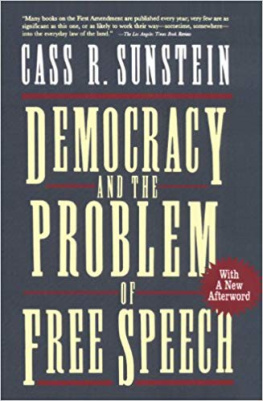Jacob Mchangamas history of the worlds strangest, best idea is the definitive account we have been waiting for. It teems with valuable insights, lively characters, and the authors passion for the cause he has done so much to advance. Mchangama brings to life the ancient struggles which established free speech and also the modern dangers which embattle it. Free Speech is that rare book which will impress scholars as much as it entertains readers, all while telling the worlds most improbable success story.
J ONATHAN R AUCH , author of The Constitution of Knowledge
A lot of people now claim that free speech is a danger to democracy or social inclusion. In this vital book, which is as entertaining as it is erudite, Jacob Mchangama shows why that is dead wrong. Drawing on both historical analysis and normative argument, he makes a compelling case for why anyone who cares about liberty or justice must defend free speech.
Y ASCHA M OUNK , author of The Great Experiment: Why Diverse Democracies Fall ApartandHow They Can Endure and associate professor at Johns Hopkins University
In Free Speech, Jacob Mchangama presents a compelling case for the unique, universal, enduring importance of free and equal speech for all people, regardless of their particular identities or ideologies. This fascinating account of magisterial scope demonstrates the constant liberating and equalizing force of free speech throughout history and around the world. It also documents the constant censorial pressures, including many that reflect positive aims, and their inevitable suppression of full and equal human rights.
N ADINE S TROSSEN , former national president, American Civil Liberties Union
Copyright 2022 by Jacob Mchangama
Cover design by Chin-Yee Lai
Cover images copyright Channarong Pherngjanda/Shutterstock.com
Cover copyright 2022 by Hachette Book Group, Inc.
Hachette Book Group supports the right to free expression and the value of copyright. The purpose of copyright is to encourage writers and artists to produce the creative works that enrich our culture.
The scanning, uploading, and distribution of this book without permission is a theft of the authors intellectual property. If you would like permission to use material from the book (other than for review purposes), please contact permissions@hbgusa.com. Thank you for your support of the authors rights.
Basic Books
Hachette Book Group
1290 Avenue of the Americas, New York, NY 10104
www.basicbooks.com
First Edition: February 2022
Published by Basic Books, an imprint of Perseus Books, LLC, a subsidiary of Hachette Book Group, Inc. The Basic Books name and logo is a trademark of the Hachette Book Group.
The Hachette Speakers Bureau provides a wide range of authors for speaking events. To find out more, go to www.hachettespeakersbureau.com or call (866) 376-6591.
The publisher is not responsible for websites (or their content) that are not owned by the publisher.
Library of Congress Cataloging-in-Publication Data
Names: Mchangama, Jacob, 1978 author.
Title: Free speech : a history from Socrates to social media / Jacob Mchangama.
Description: First edition. | New York : Basic Books, 2022. | Includes bibliographical references and index.
Identifiers: LCCN 2021034456 | ISBN 9781541600492 (hardcover) | ISBN 9781541620339 (ebook)
Subjects: LCSH: Freedom of speechHistory. | CensorshipHistory. | InternetSocial aspects. | CommunicationPolitical aspects.
Classification: LCC JC591 .M33 2022 | DDC 323.44/3dc23/eng/20211001
LC record available at https://lccn.loc.gov/2021034456
ISBNs: 9781541600492 (hardcover), 9781541620339 (ebook)
E3-20211208-JV-NF-ORI
For Sarah, Leo, and Norma
T he commander in chief had had it with the press. Hed spent his time in the highest office of the land trying to do the best for his people, but all the press did was undermine him and endanger the nation. There he was, making the country great again, and what did they write about? His marriages, his divorces, his children, even his weight! It was time the purveyors of fake news paid the price for their slander, sedition, and outright treason. The most powerful man in the country decided it was time to push back, launching a 136-character broadside banning
writings and books, as well imprinted as other in which such writings and books many open and manifest errors and slanders are contained.
The story of Englands mercurial Henry VIII (who else?) sounds contemporary because it is. Free Speech is never ultimately won or lost. Ask a college student when the fight for free expression began, and you might get any one of a number of responses. Some Americans would say it started with the ratification of the First Amendment in 1791. A European might point to the 1789 French Declaration of the Rights of Man and of the Citizen. A British person might cite John Miltons Areopagitica, published in 1644. Whatever their differences, most would describe freedom of speech as a uniquely Western concept born somewhere around the Enlightenment. The reality is far more complex.
In truth, the roots of free speech are ancient, deep, and sprawling. The Athenian statesman Pericles extolled the democratic values of open debate and tolerance of social dissent in 431 BCE. In the ninth century CE, the irreverent freethinker Ibn al-Rwand used the fertile intellectual climate of the Abbsid Caliphate to question prophecy and holy books. In 1582 the Dutchman Dirck Coornhert insisted that it was tyrannical to forbid good books in order to squelch the truth. The first legal protection of press freedom was instituted in Sweden in 1766 and Denmark became the first state in the world to abolish any and all censorship in 1770.
Yet, almost invariably the introduction of free speech sets in motion a process of entropy. The leaders of any political systemno matter how enlightenedinevitably convince themselves that now freedom of speech has gone too far. Autocratic oligarchs disdainful of sharing power with the masses twice overthrew the ancient Athenian democracy, purging proponents of democracy and dissent along the way. Hardening laws against apostasy and blasphemy curtailed the most daring freethinking in medieval Islam. In the Dutch Republic of the sixteenth century, Dirck Coornhert was exiled and his writings banned on several occasions. Both Swedens and Denmarks experiments with press freedom were short-lived as absolutist rulers took back control of the printing presses. This phenomenon of free speech entropy is as relevant today as it was 2,500 years ago, and when looking closer, the justifications for limiting free speech in the twenty-first century have more in common with those used many centuries past than perhaps we would like to admit.
The global club of free democracies is shrinking fast. As in ancient Athens, aspirational autocratsfrom Viktor Orbn in Hungary to Narendra Modi in Indiaview freedom of speech as the first and most important obstacle to be cleared on the path to entrenching their power. In parts of the Islamic world, blasphemy and apostasy are still punishable by death, whether enforced by the state or by jihadist vigilantes. The global free speech recession even extends to liberal democracies, whonot unlike Henry VIIIare fearful of the consequences of disinformation and hostile propaganda spreading uncontrollably among the masses through new technology.
Free speech entropy is not merely political, but deeply rooted in human psychology. The drive to please others, the fear of outgroups, the desire to avoid conflict, and everyday norms of kindness pull us in the direction of wanting to silence uncomfortable speakers, whether on digital platforms, at college campuses, or in cultural institutions. Like a massive body in outer space pulling in all the matter close to it, censorship draws us all in. It is therefore all the more vital to actively foster and maintain a culture of free speech to ensure that this freedom continues. Laws are not enough on their own.


